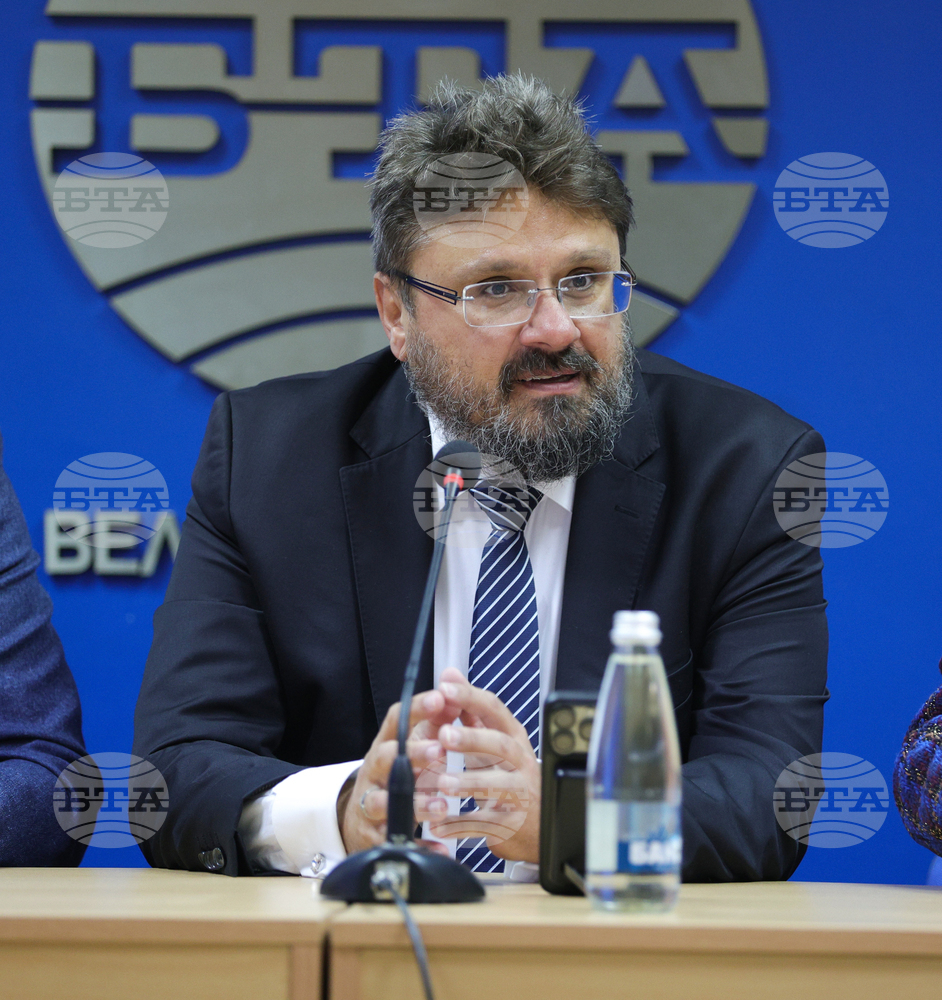site.btaBTA's Europe on Balkans: Cohesion Skills Project Aims to Tell About Exchange of Knowledge Between People


The Europe on Balkans: Cohesion Skills project aims to talk about the exchange of knowledge between the people of Bulgaria and the Balkans and the people of the rest of the European Union, so that both sides mutually recognize their respective contribution, said BTA Director General Kiril Valchev at the opening of the local conference, which is being organized at the National Press Club of BTA in Veliko Tarnovo on Monday.
"We usually hear that Bulgaria receives money from the EU, and the impression remains that we Bulgarians are the ones who only benefit from our participation in the Union, but the truth is that the EU also benefits from Bulgarians, just as it benefits from the other European nations", Valchev pointed out, adding that participants of these conferences in different regions of Bulgaria have talked about various such contributions of Bulgarians.
He recalled that one of the talking points at the project's opening conference in Veliki Preslav was the inclusion of the Cyrillic alphabet as the third alphabet in the EU thanks to Bulgaria, while at the conference in Plovdiv participants from the University of Food Technologies emphasized Bulgaria's contribution in the field of food, pointing out that the entire Balkans have some of the tastiest food in all of Europe. In Petrich, as a city on two borders with Greece and the Republic of North Macedonia with a highly developed business, the emphasis of the conference was on the entrepreneurial spirit of Bulgarians, but also for people to understand that they don't have to move to the other end of Europe to realize their ideas, as this is absolutely possible to happen in Bulgaria as well.
Valchev noted that the conference in Veliko Tarnovo is held on the day when the Orthodox Church honours the memory of Saint Euthymius of Tarnovo, pointing out that this is another significant contribution of Bulgaria to European civilization and to Christianity, on which values the EU is built. He said that those values included understanding and tolerance towards others, even when people don't share the same faith, which is why people of different religions in Bulgaria and in the EU live peacefully together.
According to Valchev, the person of Saint Euthymius of Tarnovo shows at least four contributions of Bulgaria to Europe. The first one is the protection of Europe during the Middle Ages, when Bulgarians, at the cost of losing their own state (and the exile of their last Patriarch), slowed down the Ottomans to the extent which allowed Europe to remain Christian.
"The second contribution is the flowering of Bulgarian literature as part of European literature in the time of Saint Euthymius of Tarnovo, who, in the words of Clementina Ivanova in her book about him, participated in the creation of a literary language where it did not exist, by stylistically unifying the literary fund of high literature, removing inaccurately translated texts and rediscovering the beauty and strict normativity of the literary language for Bulgarians", Valchev emphasized.
He noted that he third contribution of Bulgaria to Europe was the creation of a community of great spiritual figures, including Saint Euthymius of Tarnovo, his teacher Saint Theodosius of Tarnovo, Gregory Tsamblak and Cyprian, Metropolitan of Kiev and All Rus.
Valchev said that the fourth contribution was to the European spirit, as Saint Euthymius of Tarnovo "took care of the soul of the Bulgarians and the fruits of the spirit," he said, citing Magdalena Legkostup, Dean of the Orthodox Theological Faculty of Veliko Tarnovo University.
He said that the joining of mind and heart allows Bulgarians to share everything in life with other people, from higher knowledge to everyday moments. This is also a contribution of Bulgarians in today's EU, where there is a lot of alienation between people, said Valchev, emphasising that Bulgarians have a sense of community and family, which impresses other Europeans especially from Western and Northern Europe, where interpersonal ties are much weaker.
"This is also particularly evident here in Veliko Tarnovo, one of the most attractive places for tourists in Bulgaria and in Europe in general. And this ability of Bulgarians to communicate with each other with understanding and emotion should give us self-confidence," he said.
"After all that has been said about Saint Euthymius of Tarnovo, in the end, we, like Gregory Tsamblak in his Eulogy for him, should ask ourselves - and so, will we dare to praise him," Valchev asked, calling on people to answer categorically with "Yes!".
"Saint Euthymius of Tarnovo is someone who preserved Christianity in Europe, which are the values on which we are building (Europe) today", Valchev recalled, concluding that this is why the words written by the Patriarch himself in his Praise for Saint Kyriaki the Great Martyr can be said about him: The angels were amazed, the righteous were horrified, the demons were ashamed, the martyrs rejoiced, the prophets praised, the angels met, the archangels endured, the authorities sent away, the forces supported.
Through this initiative, BTA aims to raise public awareness and foster open dialogue about cohesion policy, local achievements, and the implementation of the EU's policy priorities. Between November 2024 and September 2025, BTA will host discussions at its press clubs in the following cities: Blagoevgrad, Burgas, Varna, Veliko Tarnovo, Vidin, Vratsa, Gabrovo, Dobrich, Kazanlak, Kardzhali, Kyustendil, Lovech, Montana, Pazardzhik, Pernik, Pleven, Razgrad, Ruse, Samokov, Svishtov, Sliven, Smolyan, Sofia, Stara Zagora, Troyan, Targovishte, Haskovo, Shumen, and Yambol. Cross-border conferences will be held in Belgrade, Bosilegrad, Bucharest, Edirne, Skopje, and Thessaloniki. The project builds on the Europe in the Balkans: A Common Future and Europe in Bulgaria: A Common Future projects, implemented by BTA in 2023 and 2024, respectively.
/NF/
Additional
news.modal.image.header
news.modal.image.text
news.modal.download.header
news.modal.download.text
news.modal.header
news.modal.text


































